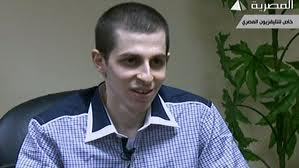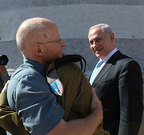
For the first time in over five years, we did not recite it.
The prayer, found at the bottom of page 72 of our weekday Siddur, was simple and short. It comes from the traditional liturgy:
“May the Holy One be merciful to our fellow Jews who wander over sea and land, who suffer oppression and imprisonment. May God soon bring them relief from distress and deliver them from darkness to light, from subjugation to redemption, and let us say Amen.”
If you have been to minyan over the last five years, you have heard this prayer and, if you have been to minyan a number of times, you may even have memorized it.
It became a sacred act each time we came together as a community to remember that this young man was being held with no contact with the outside world and that he and his family were suffering.
As Jews, we are obligated to care for each and every Jew—Kol Yisrael areivim zeh bazeh. We are not a large people. We make up a very small percentage of the world’s population. We carry a sacred trust, but we have been the subject of intense persecution, discrimination, hatred, and violence.
If we do not stick together and take care of each other, how will we survive?
This morning, Gilad Shalit was freed. I watched as he was forced to do an interview for Egyptian television. This poor young man, shell-shocked, traumatized beyond words, was forced to answer a number of inane and inappropriate questions.
But then I saw the picture of him with his father—an embrace, a hug, tears—and I could only begin to imagine the feeling.
But I was brought back to the absurd question that the Egyptian TV reporter asked Gilad Shalit. She asked him about the four thousand Palestinian prisoners who are still in Israeli jails—what did he think about them?
This kind of equivalence reflects flawed thinking. Someone who is a suicide bomber, who has murdered people, who has planned devastating attacks on civilians, is not equivalent to a soldier who is standing guard on the border. It is universally recognized that these are different roles with different standards.
In addition, all those who are held in Israeli jails for crimes they committed have been prosecuted, brought to trial, and have access to the outside world with treatment that meets international standards. Gilad Shalit had nothing—he was alone, abused, and did not see daylight. The pictures told the story of the difference in treatment.
The New York Times had a huge picture of a granddaughter of one of the Palestinian prisoners being released. She looked sad, plaintive. It was striking that, although there were pictures of some of the sites of the suicide attacks that these prisoners had orchestrated, there were no pictures of their victims.
There were no pictures of Israeli children who have no parents, of parents whose children have been murdered, of entire families who were wiped out.
We must remember the truth.
Israel, led by Ehud Barak, the Prime Minister of Israel in the year 2000; and the Palestinians under Yasser Arafat, the head of the Palestinian Authority in the year 2000; and with President Bill Clinton’s guidance; almost came to a deal. There were just a few issues keeping them apart.
But it is my understanding that, in the end, the Palestinians wouldn’t accept the final compromise, actively choosing instead a path of violence once again, killing 1500 Israelis in a new Intifada that they initiated. And, as Israel tried to protect itself from these attacks, thousands of Palestinians died as well.
Even after all this violence, Israel left the Gaza strip establishing an international border. Now, we were told if Israel was attacked, it would be an act of war and Israel could defend herself. But after 8,000 missiles the world said nothing and when Israel finally had to respond, she was criticized for her action. Gilad was abducted while patrolling the international border by terrorists who dug a tunnel into Israel, killed his comrades, wounded him, and dragged him to Gaza.
While, thankfully, the Shalit family has their son at home, there are 2,816 parents in Israel who have lost their children to terror in the last ten years, and they live daily with the nightmare that their children will never be coming home.
These children did not have to die.
The last ten years could have played out very differently if the Palestinians had accepted an accord, if they had moved closer to peace, if they had educated their people towards peace, or if the Palestinians had not embarked on a second Intifada.
That is not to say that everything that Israel did over the last ten years was right. Its approaches to some of the settlements have not been helpful, and at times, its politicians did not step up to the plate as they should have.
The decision whether or not Gilad Shalit should be ransomed for 1,027 Palestinian prisoners was agonizing. Most of these 1,027 are terrorists; many of them were serving life sentences for devastating attacks.
On Sukkot we studied texts related to the mitzvah of pidyon shevuyim, of redeeming captives; we juxtaposed it to the mitzvah of piku’ah nefesh, of saving a life. Is it worth redeeming one captive if we are endangering the lives of many? Is it worth redeeming one captive, if we have now devastated the victims of numerous attacks whose only consolation was that the perpetrators of these crimes were behind bars?
Melanie Lidman, a Jerusalem Post reporter, interviewed many of the victims who came to share their painful stories at the High Court and to petition them not to allow these prisoners to be released.
Meir Schijveschuurder asked, “Gilad’s situation is better than mine. Can I talk to my father? Can I talk to my two-year old sister? Is there any possibility that I can talk to them in this world?” He lost his parents and three siblings in the Sbarro pizza restaurant terrorist attack in 2001 in the center of Jerusalem.
“While everyone knew that this was not a practical exercise (the prisoners were going to be freed, and the High Court would not overturn the decision), this was a time when reporters and Israel listened to the victims and to their pain. Haya Rund said after exiting the court room, ‘I feel like the walls aren’t moving, like you’re talking to a wall and it doesn’t help, because we already know the answer. But it is important to stand up and to talk and to yell and be heard. It’s part of the process that you didn’t just stand and shut up, but you did something.’ Her son, Erez, was killed by a sniper on his way from Eli to Ofra on June 6, 2002.”
This was a very tough decision for Israel, and a bittersweet day. A day where, thankfully, one man who had been unjustly imprisoned was brought home.
Even though freeing these terrorists denied justice (freeing murderers who deserve anything but freedom), reopened painful wounds for the families of the victims of these terrorist attacks, encouraged new kidnapping attempts, and brought a serious risk that these terrorist will commit new acts of violence, Israel places life above all else.
While we have stopped reciting the prayer for Gilad Shalit, we should continue to recite prayers for Israel, both aloud and in our hearts, and pray that all of those terrorists who were released turn from their violent ways to paths of peace.
For that is the only way that the world can move forward.
Praying for the peace of Jerusalem,
This post has been contributed by a third party. The opinions, facts and any media content are presented solely by the author, and JewishBoston assumes no responsibility for them. Want to add your voice to the conversation? Publish your own post here. MORE

